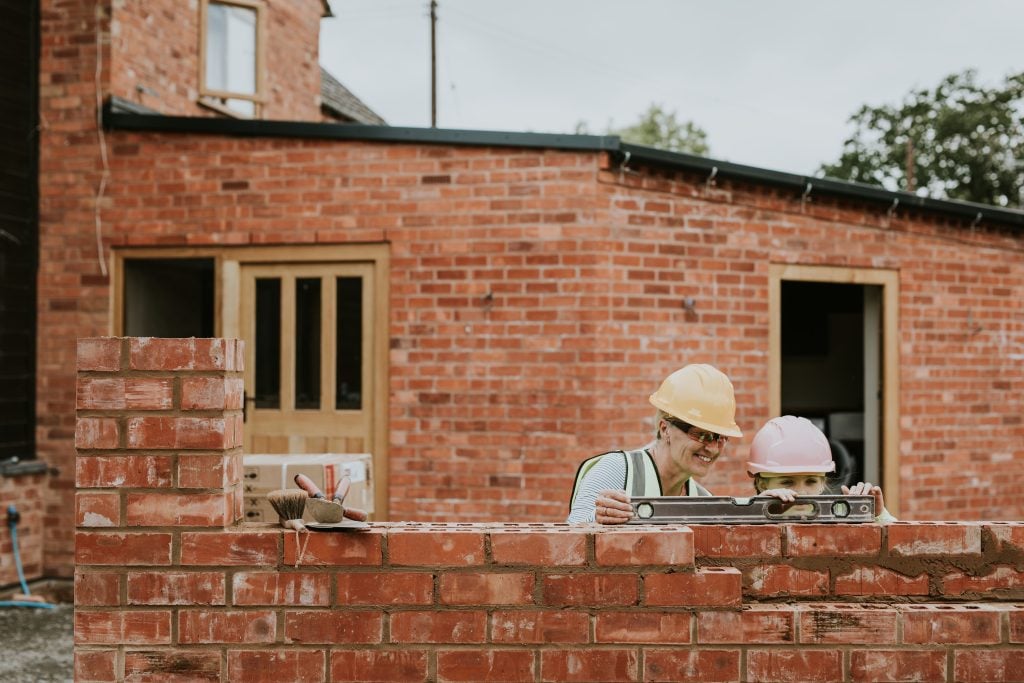

Extending your home is a brilliant way to gain extra space without the hassle of moving. However, the prospect of calculating the costs can initially seem overwhelming. Various rules and regulations will apply to your extension, each with its own associated costs.
If you prefer to discuss your project with an expert instead of delving into the details yourself, feel free to book a free 20-minute call with one of our home improvement architects.
Otherwise, let’s break down the numbers to give you a rough idea of how much it might cost to build your extension.
Understanding the Types of Extensions
When considering an extension, it’s important to understand the different types available. Here are some key options:
- Single-storey extensions: These are often simpler and cheaper to build, making them a popular choice for many homeowners. They typically involve less structural work compared to multi-storey extensions and can be used to create additional living space, such as an expanded kitchen or a new living room. The overall cost will vary based on the size and materials used.
- Multi-storey extensions: While these can add significantly more space, they also come with higher costs and complexities. Multi-storey extensions require more structural support and often involve changes to the existing foundation and roof. They are ideal for adding multiple rooms or creating more living space on different levels.
- Rear extensions: These extend from the back of the house and are great for kitchen and living space enlargements. Rear extensions are a common choice for creating open-plan living areas and can seamlessly connect the indoors with the garden. The costs can vary widely based on the design and size.
- Side extensions: Utilising the space at the side of the house, side extensions are suitable for adding rooms or extending existing ones. They are often used to create additional bedrooms, bathrooms, or utility rooms. Side extensions might face restrictions if they encroach on neighbouring properties, so it’s important to check local planning regulations.
- Wrap-around extensions: Combining rear and side extensions, wrap-around extensions offer maximum space but at a higher cost. These extensions can dramatically change the layout of your home and provide extensive new living areas. Due to their complexity, they usually require detailed planning and a larger budget.
- Conservatories and orangeries: Popular choices for adding elegant, light-filled spaces to your home. Conservatories are typically less expensive than full brick-built extensions and can be used as additional living or dining areas. Orangeries, which feature more brickwork and a solid roof, offer a more permanent extension feel.
Each type has its own benefits and cost implications, so it’s essential to consider your requirements carefully.
Initial Planning and Design Costs
Before starting your extension, initial planning and design are crucial steps. Hiring an architect or designer to draw up plans and designs is often the first expense.
These professionals ensure that your vision is brought to life and that all necessary details are included. Furthermore, obtaining planning permission and adhering to building regulations are essential aspects of the process.
The costs associated with planning applications can vary, but they are a necessary part of ensuring your extension is legal and safe. Therefore, investing in thorough planning and design at the outset can save time and money in the long run.

Build Costs your extension
The main governing factor of the cost of an extension is square footage or square meterage – how big it is. So, the bigger it is, the more it’s going to cost. Typically, if you worked out a square meter at £1500, that’s a good base price for basic quality; £1900 per square meter for good quality and £2200 per square meter for excellent quality.
Rear/Side Extension (Single Storey)
For an average single storey extension of 20 square metres, the build cost would be from £30,000 for basic quality, from £38,000 for good quality, and from £44,000 for excellent quality.
Double Rear/Side Extension (Two Storey)
Budget from £53,000
Loft Conversion
(Best roof type for the loft extension is a gabled roof (2 sides slope) rather than a hipped roof (all 4 sides slope))
Types of Loft Conversions
- Room Loft Conversion
Budget from £15,000 - Dormer Loft Extension
Budget from £20,000 or from £35,000 with the inclusion of an en suite - ‘Raising the Roof’ or Changing the Roof Structure
Budget from £40,000 - Hip to Gable Roof Extension
Budget from £25,000
A single storey extension of 20 square metres of basic quality will will cost you a minimum of £44,000 including most fees, but excluding interior fit-out costs.
– Yoop Architects
TWEET THIS
Interior Fit-Out Cost your extension Guide
(These costs are in addition to the build cost of the extension)
- Kitchen
Budget from £7,000 to £15,000 – the biggest cost factor is the appliances – the better the appliances, the higher the cost
- Bathroom
Budget around £5,000 assuming you can connect to existing pipework - Utility Room
Budget from £1,500 to £11,000 depending on size and quality of appliances - Flooring
Budget from £25 to £100 per square metre - Underfloor Heating
Budget from £10,000 to £15,000 - New Boiler
Budget from £2,000 to £3,000 depending if the boiler is being fitted in an existing or new location - Wall and Ceiling Finishes
Budget around £85 per square metre for plaster or dry-lining plus paint - Bi-fold or Sliding Doors
Budget from £1,500 to £2,000 per linear metre
Professional Fees
- Measured survey – £500 to £1,500
- Planning and construction drawings – £2,700 to £4,000
- Architect design fees – three to seven percent of the build cost (e.g. a fee of £900 to £2,100 for a £30,000 extension)
- Structural engineer – £500 to £1,000
- Contract management (employing someone to hire the builders/tradesmen) – three to seven percent of the build cost (e.g. a fee of £900 to £2,100 for a £30,000 extension)
- Project management by a building contractor or architect will be 15 to 20 percent (up to £4,500) on top of the net cost of labour, materials and overheads
- VAT at 20 percent of the labour, materials and services if applicable
An extension of 20 square metres at a build cost of £30,000 could potentially attract professional fees from £12,000.
Permission Fees
Additional reports that may be required
- Tree report – from £250
- Flood risk assessment – from £250
- Ecology report – from £400
- Historic building report (if your home is a listed building)
Other
- Building Regulations Approval
You don’t need to get approval yourself if you use someone registered with a competent person scheme. If you are carrying out the building works yourself, or you’re working with someone who’s not registered with a competent person scheme, then budget from £400 – £750 - Party Wall Agreement
(Covers shared walls/structures and protects both yourself and your neighbours whilst work is being carried out) You can issue a Party Wall Notice yourself (for no charge) to each of your affected neighbours. If your neighbour agrees to the works in writing, you will not require a Party Wall Agreement.If the neighbour refuses to give consent or fails to respond within 14 days, then a surveyor will need to be appointed to arrange a Party Wall Award that will set out the details of the work which will carry a fee of £700 to £1,000 per neighbour - Build Over Agreement
(If you’ve got a shared drain running across the back of your garden and you’re going to build over it or within three meters proximity)
Budget around £335
All together, it’s worth setting aside at least £2,000 to cover any fees for permissions and sign off
Insurance
If you are carrying out conversion/extension works you should arrange specialist insurance to cover the new works and the existing structure as most home insurers won’t cover works if contracts exceed £50,000. For expert advise on this and any other insurance exposures, please contact Gary Philip at GPS Insurance Brokers on 020 8207 7385. GPS Insurance
Share this…
Total Cost your extension
For a single storey extension of 20 square metres of basic quality, this will give you a minimum spend of £44,000 including most fees, but excluding interior fit-out costs.
Two Storey
For a two storey extension, if the second storey is the same size as the first, then the generally accepted rule is to add 50% extra to the cost of a single storey extension plus an additional 10% for professional fees and VAT.
This gives you a minimum spend of about £87,000, including most fees, but excluding the interior fit-out cost for your extension.
Getting An Accurate Figure
To calculate the cost of your extension of the project, Yoop Architects take a measured survey of your property, which captures all the information. Then we draw it all up in 3D and create sketches to show sometimes five or six options if it’s not entirely clear how you want to achieve your brief.
A lot of the time there are different ways of achieving your desired result, and the more you work with the building, the cheaper, easier, and faster your build will be. Once you’ve got a favourite scheme or a couple of favourite schemes, we have a phase called ‘Meet the Builders.’. That’s when we can introduce you to a couple of builders; they visit the property, and they give you a ballpark figure.
How Yoop Architects can Help
Yoop Architects: The Housing Extension Professionals of North London Home Extensions. Quality in design and management in cost-effective house extensions. All those things and more that homeowners aspire to attain from a budgetary plan or perspective and compliance with regulations will be facilitated through our know-how.
Comprehensive Services:
Cost Appraisal in Detail: We will help you to create your way at finding an appropriate budget right from the beginning, taking into account all major aspects, material, labour, planning fees, and unexpected costs.
Adequate Design Solutions: Your extension house is designed by the team of professionals who arrange to maximise your space and functional efficiency while controlling costs. Customised solutions are offered to suit the style of the the home and lifestyle needs.
Planning & Permissions: Advisories & Extensions much of the time are either requiring a planning permission or submission to the building regulations. We take care of each and every necessary approval, which makes your project comply with local authority requirements, saving you from further delays or extra costs.
Material & Construction Advices: It is in choosing the right materials: Their aesthetic and long-term durability influence the appearance and endurance of your extension. We offer expert advice regarding creating high-quality yet cost-effective materials from which you can get the maximum value for your dollars.
Project Management Support: We will see to it that the extension project will be cumbersome; there is the whole process from conception to completion ongoing in the project. The team will observe and coordinate with contractors, suppliers, and local authorities in order to achieve completion timely and within budget.
Final Thoughts
Home extensions are a significant investment that improves liveability and returns on the property. Unfortunately, if not well planned, costs may skyrocket really fast. With Yoop Architects, you have access to professional advice and project management, which guarantees a hassle-free, seamless, and budget-conscious experience.
From kitchen extensions and loft conversions to larger home expansions, we are with you every step of the way.

